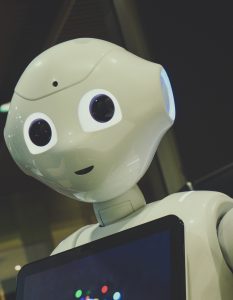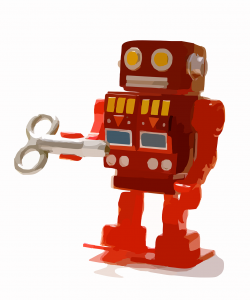 Artificial Intelligence (AI) – systems able to collect and analyze structured or unstructured data and make decisions based on that information to achieve a defined goal[1] – were a widely discussed subject at the 2019 edition of the European Dialogue on Internet Governance (EuroDIG).
Artificial Intelligence (AI) – systems able to collect and analyze structured or unstructured data and make decisions based on that information to achieve a defined goal[1] – were a widely discussed subject at the 2019 edition of the European Dialogue on Internet Governance (EuroDIG).
Today, AI continues to fundamentally change the way people use and interact with the internet[2]. Given that the internet deeply affects the library and information service fields, it is important for libraries to “stay ahead of the digital curve”, in order to be able to continue to uphold their values and offer services which meet society’s needs.
AI isn’t just something for the private sector. Several countries are looking for ways to integrate AI technology into their public services (for example, see the Agency for Digital Italy). There are many possible uses: optimising street traffic, helping public employment agencies, determining eligibility for welfare programmes, visa and immigration applications and more[3].
Naturally, more reliance on AI for public service delivery requires internet access and basic digital literacy for the population to use e-services (as reflected in the UN Secretary-General’s High-level Panel on Digital Cooperation report recommendation that by 2030 every adult should have access to digital financial and health services, and the broad theme of the report, “Leaving No One Behind”).
Internet access and digital literacy courses are services that many (in some countries, almost 90%)[4] libraries are already offering. The growing necessity of giving people access to connections will only make them more important. Crucially, they can help marginalised populations who cannot afford a broadband subscription adapt to the digitalisation of public services.
Even if every citizen has access to the internet and basic digital literacy skills, the internet they interact with will also be increasingly shaped by AI.
On the user and content levels, AI is often used for moderation. However, the effectiveness of AI in moderating supposedly harmful content is often questioned, and many agree that right now this task cannot be carried out by AI alone, and human moderators are still needed.
However, some EuroDIG 2019 participants argued that the sheer amount of online content generated every day, as well as the growing pressure on popular platforms to control harmful content, could make more AI moderation seem like an attractive solution.
More broadly, AI could impact physical internet access by moderating, predicting and regulating internet traffic for improved efficiency. Both uses could have implications for freedom of access to information and freedom of expression, since the bias in AI can reinforce existing inequalities.
Libraries around the world stand for the principles of access to information and freedom of expression, and these principles should be at the heart of the debate on AI internet governance.
What Libraries Can Do for a Society Living with AI
- Use AI responsibly. Today, libraries are under pressure to deliver maximum value and justify their public funding. That is why it can be tempting to turn to AI, hoping to maximize efficiency. However, it is important for libraries to be informed about potential ethical issues of some AI use cases, and make ethical choices to safeguard public trust. For example, the 2019 Mozilla Internet Health Report suggests thermal sensors as an alternative to cameras for collecting crowd and visitor data[5]. This solution achieves the same goal without compromising privacy concerns, and shows a commitment to ethical standards.
- Support ethical AI research. As the use of AI grows, many governments and NGOs are looking for better data for AI training models and improved data collection practices. As discussed earlier, libraries can supply a wealth of high-quality datasets for machine learning[6]. Academic libraries in particular have large repositories of data from quantitative studies, coded and labelled according to high scientific standards. Trained specialised librarians can also actively assist in ethical AI research, offer their data literacy expertise and promote ethical data handling and collection methods, especially in local contexts.
- Expand their efforts to support literacy. In the last few decades, many libraries have started providing digital literacy training; today, algorithmic literacy is becoming particularly important. This form of literacy includes recognizing when you interact with AI, understanding how it determines which information you find online, and knowing how your private data is collected by AI algorithms. Libraries can include these skills in their digital literacy programmes. Several ongoing research projects, such as “RE:search” and “UnBias”, outline the best ways to develop algorithmic literacy skills among lay users. Librarians can use the insights provided by state-of-the-art research, and organize classes to help their patrons develop these skills.
- Encourage public debate around AI. In addition, libraries can use their role as community hubs to encourage debate and citizen participation to discuss the functions of AI in society. Because of the many ways AI can change society, some stakeholders at EuroDIG 2019 advocated broad public consultation on the uses of AI by the government. This requires the public to be informed and proactive; and libraries can provide both a physical forum and the unbiased information to initiate such a debate. For example, they can enable local residents to communicate their problems to the AI Commons initiative, which brings together AI developers and problem owners.
- Education to live with AI, education with the help of AI. Society is facing an enormous task of transforming education systems to cope with the changes in labour markets caused by AI and automation. One of the biggest priorities is encouraging lifelong learning and improving social inclusion in educational settings[7]. Libraries can play a big role in achieving these goals – they provide access to knowledge and information with no entry barriers, and they can be particularly suitable for helping older learners and non-digital natives[8]. On the supply side, AI can also help libraries create reproducible and customisable learning tools, which would work well together with a librarian’s personal guidance for a non-digital native user.
In its best use-cases, AI can bring many advantages and societal benefits. Libraries can help to make sure that, truly, no one is left behind in this progress. Public internet access and digital literacy programmes can help more people enjoy the benefits of AI – from healthcare bots to easier travel.
But more importantly, libraries can help the people who are most at risk of falling behind if AI and automation increase existing inequalities. The knowledge and information that libraries offer can help people learn new skills to navigate the changing labour market, improve their livelihoods, and help make their voices heard in political discussions.
[1] European Commission High-Level Expert Group on Artificial Intelligence (2019), A definition of Artificial Intelligence: main capabilities and scientific disciplines, 8 April 2019
[2] Internet Society (2017), Artificial Intelligence and Machine Learning, policy paper
[3] Carrasco, Miguel, Mills, Steven, Whybrew, Adam, and Jura, Adam (2019), The Citizen’s Perspective on the Use of AI in Government, 1 March 2018
[4] Alleman, Kate (2018), Digital Literacy Support in Libraries: More than Just Your Computer Classes, 1 May 2018
[5] Mozilla (2019), 2019 Internet Health Report
[6] IFLA (2018), The Robots are Coming? Libraries and Artificial Intelligence, blog, 24 July 2018
[7] Michel Servoz (2019), “The Future of Work? Work of The Future! On how artificial intelligence, robotics and automation are transforming jobs and the economy in Europe”, report to the European Commission, 3 May 2019
[8] IFLA and TASHA (2019), Development and Access to Information 2019, report
 Artificial intelligence (AI) systematically tops popular lists of the most important emerging technologies. With a mix of fear and excitement, commentators seem to agree that it will shape the future, although not always on how.
Artificial intelligence (AI) systematically tops popular lists of the most important emerging technologies. With a mix of fear and excitement, commentators seem to agree that it will shape the future, although not always on how.